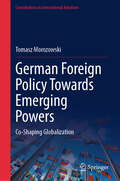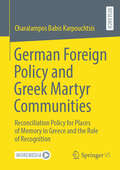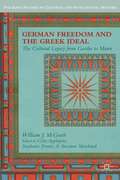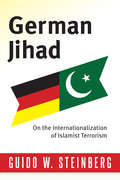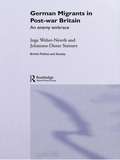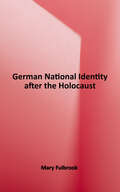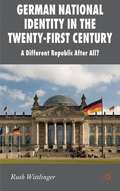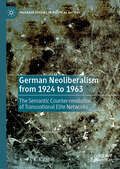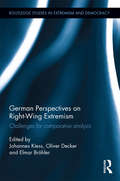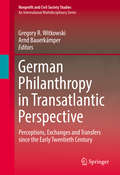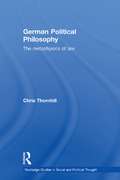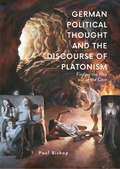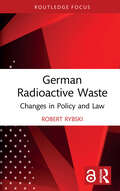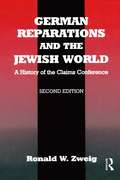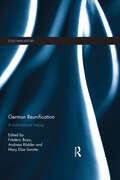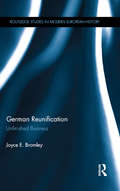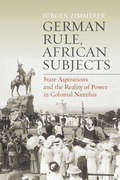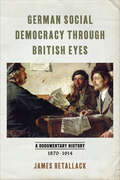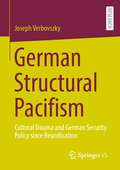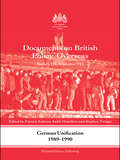- Table View
- List View
German Expansionism, Imperial Liberalism, and the United States, 1776-1945
by Jens-Uwe GuettelThis book traces the importance of the United States for German colonialism from the late eighteenth century to 1945, focusing on American westward expansion and racial politics. Jens-Uwe Guettel argues that from the late eighteenth century onward, ideas of colonial expansion played a very important role in liberal, enlightened, and progressive circles in Germany, which, in turn, looked across the Atlantic to the liberal-democratic United States for inspiration and concrete examples. In the early years of the twentieth century, this America-inspired and -influenced imperial liberalism dominated German colonial discourse and practice. Yet following this pre-1914 peak of liberal political influence on the administration and governance of Germany's colonies, the expansionist ideas embraced by Germany's far-right after the country's defeat in the First World War had little or no connection with the German Empire's liberal imperialist tradition. German Expansionism, Imperial Liberalism, and the United States, 1776-1945 therefore shows that, for example, Nazi plans for the settlement of conquered Eastern European territories were not directly linked to pre-1914 transatlantic exchanges concerning race and expansionism.
German Foreign Policy Towards Emerging Powers: Co-Shaping Globalization (Contributions to International Relations)
by Tomasz MorozowskiThis book examines the complex process of German foreign policy adaptation to a shifting global landscape, especially to the rise of new powers. Addressing a scholarly audience, the book sheds light on the evolution of Germany's post-reunification international role beyond the Euro-Atlantic structure. Grounded within the theoretical framework of neoclassical realism, the book analyzes the inner workings of Germany's global policy formation. It scrutinizes the state's relations with rising and emerging powers, including China, Brazil, India, South Africa, Mexico, Vietnam, Indonesia, Nigeria, Saudi Arabia, and the United Arab Emirates, exploring the details of Berlin's approach. The book presents the motives, goals, instruments, and future prospects of Germany's foreign policy regarding these states. It further explores the dynamics of Germany's civilian and economic power, while addressing the growing call for increased responsibility within the European Union as well as in global politics. Readers will gain insight into the foundations, tools, and effectiveness of Germany's foreign policy, providing a quintessential case study of how a European state navigates the challenges of a rapidly changing global landscape. This makes the book a must-read for researchers specializing in German studies as well as for scholars of international relations and foreign policy.
German Foreign Policy and Greek Martyr Communities: Reconciliation Policy for Places of Memory in Greece and the Role of Recognition
by Charalampos KarpouchtsisThe Euro crisis of 2008 had a deep impact on German-Greek relations. The exchange of blows in media, and amongst politicians created a deep divide and made old wounds visible - wounds that lie in the Occupation of Greece by Nazi Germany and its fascist allies during World War 2. In 2014 German foreign policy towards Greece shifted to include reconciliatory measures, marking the beginning of Germany's foreign policy of reconciliation. One area of focus is memory culture and the Greek martyr communities, meaning villages and towns that experienced extreme violence, destruction, and executions. Diving into these places of terror and memory, the book analyzes German foreign policy of reconciliation while providing a profound view onto history, diplomacy, and the widely unknown Greek memory landscape. It entails a thorough review of German-Greek relations, more than seven unique maps and 10 case studies, accompanied by photographs and over 35 interviews. It shows how foreign policy, conflict and reconciliation intertwine and how international affairs meet the local level of everyday citizens.
German Freedom And The Greek Ideal
by William J. McgrathThis book traces this German idea of freedom from the late Enlightenment through the early twentieth century. McGrath shows how German intellectual and artists invoked the ancient Greeks in order to inspire Germans to cultural renewal and to enrich their understanding of freedom as something deeper and more urgent that political life could offer.
German Intellectuals and the Challenge of Democratic Renewal
by Sean A. FornerThis book examines how democracy was rethought in Germany in the wake of National Socialism, the Second World War and the Holocaust. Focusing on a diverse network of public intellectuals in the immediate post-war occupation years, Sean A. Forner traces their attempts to reckon with the experience of Nazism and scour Germany's ambivalent political and cultural traditions for materials with which to build a better future. In doing so, he reveals, they formulated an internally variegated but distinctly participatory vision of democratic renewal - a paradoxical counter-elitism of intellectual elites. Although their projects ran aground on internal tensions and on the Cold War, their commitments fuelled critique and dissent in East and West during the 1950s and thereafter. The book uncovers a conception of political participation that went beyond the limited possibilities of the Cold War era and which would influence the political struggles of later decades in both post-war Germanys.
German Jihad: On the Internationalization of Islamist Terrorism
by Guido W. SteinbergSince 2007, the German jihadist scene has become Europe’s most dynamic, characterized by an extreme anti-Americanism, impressive international networks, and spectacular propaganda. German jihadists travel to Turkey, Chechnya, Pakistan, and Afghanistan, trading in jihadist ideologies and allying themselves with virulent organizations. Mapping the complicated interplay between jihadists’ personal motivations and the goals and strategies of the world’s major terrorist groups, Guido Steinberg provides the first analysis of German jihadism, its links to Turkey, and its growing, global operational importance. Steinberg follows the formation of German-born militant networks in German cities and their radicalization and recruitment. He describes how these groups join up with al-Qaeda-affiliated organizations in Afghanistan and Pakistan, such as the Islamic Jihad Union, the Islamic Movement of Uzbekistan, and the Taliban, and he plots the path that directly involves them in terrorist activities. Situating these developments within a wider global context, Steinberg interprets the expanding German scene as part of a greater internationalization of jihadist ideology and strategy, swelling the movement’s membership since 9/11. Increasing numbers of Pakistanis, Afghans, Turks, Kurds, and European converts have come to the aid of Arab al-Qaeda, an incremental integration that has worrisome implications for the national security of Germany, the United States, and their allies.
German Jihad: On the Internationalization of Islamist Terrorism (Columbia Studies in Terrorism and Irregular Warfare)
by Guido SteinbergSince 2007, the German jihadist scene has become Europe's most dynamic, characterized by an extreme anti-Americanism, impressive international networks, and spectacularly effective propaganda. German jihadists travel to Turkey, Chechnya, Pakistan, and Afghanistan, trading jihadist ideologies and allying themselves with virulent organizations. Mapping the complicated interplay between jihadists' personal motivations and the goals and strategies of the world's major terrorist groups, Guido W. Steinberg provides the first analysis of German jihadism, its links to Turkey, and its growing, global operational importance.Steinberg follows the formation of German-born militant networks in German cities and their radicalization and recruitment. He describes how these groups join al-Qaeda-affiliated organizations in Afghanistan and Pakistan, such as the Islamic Jihad Union, the Islamic Movement of Uzbekistan, and the Taliban, and he plots the path that directly involves them in terrorist activities. Situating these developments within a wider global context, Steinberg interprets the expanding German scene as part of a greater internationalization of jihadist ideology and strategy, swelling the movement's membership since 9/11. Increasing numbers of Pakistanis, Afghans, Turks, Kurds, and European converts are coming to the aid of Arab al-Qaeda, an incremental integration that has worrisome implications for the national security of Germany, the United States, and their allies.
German Migrants in Post-War Britain: An Enemy Embrace (British Politics and Society)
by Dr Inge Weber-Newth Johannes-Dieter SteinertBoth timely and topical, with 2005 marking the 60th anniversary of the end of the Second World War, this unique book examines the little-known and under-researched area of German migration to Britain in the immediate post-war era. Authors Weber-Newth and Steinert analyze the political framework of post-war immigration and immigrant policy, and the complex decision-making processes that led to large-scale labour migration from the continent. They consider: * identity, perception of self and others, stereotypes and prejudice* how migrants dealt with language and intercultural issues* migrants' attitudes towards national socialist and contemporary Germany* migrants' motivation for leaving Germany* migrants' initial experiences and their reception in Britain after the war, as recalled after 50 years in the host country, compared to their original expectations. Based on rich British and German governmental and non-governmental archive sources, contemporary newspaper articles and nearly eighty biographically–oriented interviews with German migrants, this outstanding volume, a must-read for students and scholars in the fields of social history, sociology and migration studies, expertly encompasses political as well as social-historical questions and engages with the social, economic and cultural situation of German immigrants to Britain from a life-historical perspective.
German Migrants in Post-War Britain: An Enemy Embrace (British Politics and Society)
by Dr Inge Weber-Newth Johannes-Dieter SteinertBoth timely and topical, with 2005 marking the 60th anniversary of the end of the Second World War, this unique book examines the little-known and under-researched area of German migration to Britain in the immediate post-war era. Authors Weber-Newth and Steinert analyze the political framework of post-war immigration and immigrant policy, and the complex decision-making processes that led to large-scale labour migration from the continent. They consider:* identity, perception of self and others, stereotypes and prejudice* how migrants dealt with language and intercultural issues* migrants' attitudes towards national socialist and contemporary Germany* migrants' motivation for leaving Germany* migrants' initial experiences and their reception in Britain after the war, as recalled after 50 years in the host country, compared to their original expectations.Based on rich British and German governmental and non-governmental archive sources, contemporary newspaper articles and nearly eighty biographically–oriented interviews with German migrants, this outstanding volume, a must-read for students and scholars in the fields of social history, sociology and migration studies, expertly encompasses political as well as social-historical questions and engages with the social, economic and cultural situation of German immigrants to Britain from a life-historical perspective.
German National Identity after the Holocaust
by Mary FulbrookFor over half a century, Germans have lived in the shadow of Auschwitz. Who was responsible for the mass murder of millions of people in the Holocaust: just a small gang of evil men, Hitler and his henchmen; certain groups within a particular system; or even the whole nation? Could the roots of malignancy be traced far back in German history? Or did the Holocaust have more to do with European modernity? Should Germans live with a legacy of guilt forever? And how, if at all, could an acceptable German national identity be defined? These questions dogged public debates in both East and West Germany in the long period of division. Both states officially claimed to have "overcome the past" more effectively than the other; both sought to construct new, opposing identities as the "better Germany". But, in different ways, official claims ran at odds with the kaleidoscope of popular collective memories; dissonances, sensitivities, and taboos were the order of the day on both sides of the Wall. And in the 1990s, with continued heated debates over past and present, it was clear that inner unity appeared to be no automatic consequence of formal unification. Drawing on a wide range of material - from landscapes of memory and rituals of commemoration, through private diaries, oral history interviews, and public opinion poll surveys, to the speeches of politicians and the writings of professional historians - Fulbrook provides a clear analysis of key controversies, events, and patterns of historical and national consciousness in East and West Germany in equal depth. Arguing against "essentialist" conceptions of the nation, Fulbrook presents a theory of the nation as a constructed community of shared legacy and common destiny, and shows how the conditions for the easy construction of any such identity have been notably lacking in Germany after the Holocaust. This book will be of interest to advanced undergraduate and postgraduate students in history, politics, and German and European Studies, as well as established scholars and interested members of the public.
German National Identity in the Twenty-First Century
by Ruth WittlingerWittlinger takes a fresh look at German national identity in the 21st century and shows that it has undergone considerable changes since unification in 1990. Due to the external pressures of the post-cold war world and recent domestic developments, Germany has re-emerged as a nation which is less hesitant to assert its national interest.
German Neoliberalism from 1924 to 1963: The Semantic Counter-revolution of Transnational Elite Networks (Palgrave Studies in Political History)
by Arne I. KäthnerThis book offers an in-depth study of German neoliberalism between 1924 and 1963, arguing that a neoliberal network was established in the interwar period, decades before elite networks in Great Britain and the United States fostered the ‘neoliberal revolution’ of the Thatcher and Reagan administrations. The author shows how this network strongly influenced societal developments in the 1950s and set a precedent for neoliberal projects in other countries. This success was largely due to the deliberate and strategic reorganisation of the semantic field: abandoning or reacquiring ‘abused’ concepts, challenging existing meanings, or introducing new concepts to the political scene. The book examines the Aktionsgemeinschaft Soziale Marktwirtschaft (ASM), an early neoliberal Think Tank founded in 1953 and led by Alexander Rüstow, which became an influential political actor in post-war West Germany. The author adopts a decidedly transnational approach linking and contrasting inner-German debates with those taking place transnationally among neoliberal proponents in the Mont Pèlerin Society. More than just a political study of ideologies, this book provides a historical account of the conceptual struggles over neoliberalism, the actors who engaged in them, the spheres in which they took place, and the semantic means and conceptual strategies employed, providing useful insights for scholars of German and political history, as well as political science more generally.
German Perspectives on Right-Wing Extremism: Challenges for Comparative Analysis (Extremism and Democracy)
by Oliver Decker Johannes Kiess Elmar BrählerThis book discusses right-wing extremism by analysing Germanophone research on this topic for the first time in English, including unique survey data from Germany and Austria. Highlighting how questions of terminology can become complicated when country cases are compared, the authors analyse theoretical and methodological issues in relation to the question of right-wing extremism. In Anglo-American academia, the term is often associated with fairly rare phenomena in the form of extremist political groups, whereas in Germany the term is often applied to a wide range of attitudes, behaviours and parties, including those which operate more within the mainstream political sphere. Covering an array of sub-fields such as right-wing terrorism, iconography of the extreme right and the Germanophone discussion on the differentiation of right-wing populism and right-wing extremism, the authors account not only for the centrality of right-wing extremist attitudes in Germanophone research, but also point at its often overlooked relevance for the phenomenon in general. Offering an important insight into the nuanced definition of right-wing extremism across Europe and enhancing both international debate and cross-country comparative research, this book will be of interest to students and scholars researching extremism, German politics and European politics more generally.
German Philanthropy in Transatlantic Perspective
by Gregory R. Witkowski Arnd BauerkämperThis volume examines philanthropic practices against the backdrop of the continuities, disruptions and changes in twentieth century German socio-political relations. It presents a differentiated understanding of the relationship between philanthropy and civil society that traces this connection from Germany's first democracy, the Weimar Republic, through the Nazi dictatorship and Soviet-style rule in Communist East Germany to the stable democracy of the Federal Republic of Germany. While concentrating on Germany, this volume places German philanthropy in a triangular relationship with the United States and the developing world, primarily through Africa. In particular, the contributions to the book demonstrate that despite many transatlantic exchanges between German and American philanthropic organizations, these relationships should not be reduced to bilateral exchanges but rather seen in the context of a globalizing world. More generally, this transnational study is a reminder that philanthropic activities need to be placed into their specific historical contexts. Such an analytical framework allows for more dynamic understanding of the meaning of philanthropy in society, illustrating both enduring and changing practices.
German Political Philosophy: The Metaphysics of Law (Routledge Studies in Social and Political Thought #Vol. 49)
by Chris ThornhillThis book combines philosophical, intellectual-historical and political-theoretical methodologies to provide a new synoptic reading of the history of German political philosophy. Incorporating chapters on the political ideas of Luther and Zwingli, on the politics of the early Enlightenment, on Idealism, on Historicism and Lukács, on early Twentieth-Century political theology, on the Frankfurt School, and on Habermas and Luhmann, the book sets out both a broad and a detailed discussion of German political reflection from the Reformation to the present. In doing so, it explains how the development of German political philosophy is marked by a continual concern with certain unresolved and recurrent problems. It claims that all the major positions address questions relating to the origin of law, that all seek to account for the relation between legal validity and metaphysical and theological superstructures, and that all are centred on the attempt to conceptualise and reconstruct the character of the legal subject.
German Political Thought and the Discourse of Platonism: Finding the Way Out of the Cave
by Paul BishopTaking Plato’s allegory of the cave as its starting-point, this book demonstrates how later European thinkers can be read as a reaction and a response to key aspects of this allegory and its discourse of enchainment and liberation. Focusing on key thinkers in the tradition of European (and specifically German) political thought including Kant, Marx, Hegel, Nietzsche, Heidegger, and the Frankfurt School, it relates them back to such foundational figures as Rousseau, Aristotle, and in particular Plato. All these thinkers are considered in relation to key passages from their major works, accompanied by an explanatory commentary which seeks to follow a conceptual and imagistic thread through the labyrinth of these complex, yet fascinating, texts. This book will appeal in particular to scholars of political theory, philosophy, and German language and culture.
German Radioactive Waste: Changes in Policy and Law (Routledge Focus on Environment and Sustainability)
by Robert RybskiThis book presents the universal issue of radioactive waste management from the perspective of the German legal system, analysing how lawmakers have responded to the problem of nuclear waste over the course of the last seventy years. In this book, Robert Rybski unwraps and explains the perplexing legal and social issues related to radioactive waste. He takes readers through the entire ‘life-cycle’: from the moment that radioactive material is classified as radioactive waste, through to the period of interim storage, and right up to its final disposal. However, this last step in radioactive waste management (that of final disposal) has not yet been achieved in Germany, or anywhere in the world, and has been the subject of hefty public debate for dozens of years. As a result, the book analyses the most recent regulations in place to enable final disposal. This book will be of interest to energy policy experts, academics and professionals who work in the area of nuclear energy.
German Reparations and the Jewish World: A History of the Claims Conference
by Ronald W. ZweigGerman Reparations and the Jewish World" has become a standard reference work since it was first published. Based extensively on archival sources, the author examines the difficult debate within the Jewish world whether it was possible to reach a material settlement with Germany so soon after Auschwitz. Concentrating on how the money was spent in rebuilding Jewish life, he also analyzes how the reparations payments transformed the relations bteween Israel and the diaspora, and between different Jewish political and ideological groups. This revised and expanded edition includes material on sensitive relief programmes from archives that have only recently been opened to researchers. In a new, extensive introductory essay the author reexamines the reparations, restitution and indemnification processes from the perspective of 50 years later.
German Reunification: A Multinational History (Cold War History)
by Mary Elise Sarotte Frédéric Bozo Andreas RödderThis book provides a multinational history of German reunification based on empirical work by leading scholars. The reunification of Germany in 1989-90 was one of the most unexpected and momentous events of the twentieth century. Embedded within the wider process of the end of the Cold War, it contributed decisively to the dramatic changes that followed: the end of the division of Europe, the collapse of the Warsaw Pact, the origins of NATO’s eastward expansion and, not least, the creation of the European Union. Based on the wealth of evidence that has become available from many countries involved, and relying on the most recent historiography, this collection takes into account the complex interaction of multinational processes that were instrumental in shaping German reunification in the pivotal years 1989-90. The volume brings together renowned international scholars whose recent works, based on their research in multiple languages and sources, have contributed significantly to the history of the end of the Cold War and of German reunification. The resulting volume represents an important contribution to our knowledge and understanding of a significant chapter in recent history. This book will be of much interest to students of German politics, Cold war history, international and multinational history and IR in general.
German Reunification: Unfinished Business (Routledge Studies in Modern European History)
by Joyce E. BromleyIn 1945, German families with more than 100 hectares (247 acres) of land were forced from their homes in the eastern sector by the Soviets, now in control of that area. These families were brutally evicted from their property and had their land expropriated. In the next 45 years, the GDR government would come to control all of the agricultural land. At reunification in 1990, the earlier abuse of these farmers was compounded when the German government would not restore any of this expropriated land to these families. The German government falsely accused the Soviet Union of insisting on non-restitution as a condition of reunification. Soviet leader Mikhail Gorbachev unequivocally denies this claim and insists that land issues are a German problem to resolve. The temporary land-trust agency, established by the German government in 1990 to dispose of land it inherited from the GDR, continues to exist. After 25 years, this agency still holds almost 20 percent of this expropriated land. Its agents, most of whom were reared in GDR, decide who may (or may not) lease land, the conditions of the lease, and if and when a farmer may buy land – circumstances that remain deeply controversial. Joyce Bromley draws on extensive field research, and previously untapped sources, to explore the reliability of the government’s version of these important events. Is the German government once again, without shame, discriminating against a group of its own citizens?
German Rule, African Subjects: State Aspirations and the Reality of Power in Colonial Namibia
by Jürgen ZimmererAlthough it lasted only thirty years, German colonial rule dramatically transformed South West Africa. The colonial government not only committed the first genocide of the twentieth century against the Herero and Nama, but in their efforts to establish a “model colony” and “racial state,” they brought about even more destructive and long-lasting consequences. In this now-classic study—available here for the first time in English—the author provides an indispensable account of Germany's colonial utopia in what is present-day Namibia, showing how the highly rationalized planning of Wilhelmine authorities ultimately failed even as it added to the profound immiseration of the African population.
German Rule, African Subjects: State Aspirations and the Reality of Power in Colonial Namibia
by Jürgen ZimmererAlthough it lasted only thirty years, German colonial rule dramatically transformed South West Africa. The colonial government not only committed the first genocide of the twentieth century against the Herero and Nama, but in their efforts to establish a “model colony” and “racial state,” they brought about even more destructive and long-lasting consequences. In this now-classic study—available here for the first time in English—the author provides an indispensable account of Germany's colonial utopia in what is present-day Namibia, showing how the highly rationalized planning of Wilhelmine authorities ultimately failed even as it added to the profound immiseration of the African population.
German Social Democracy through British Eyes: A Documentary History, 1870–1914
by James RetallackOn the eve of the First World War, the German Social Democratic Party (SPD) was the largest and most powerful socialist party in the world. German Social Democracy through British Eyes examines the SPD’s rise using British diplomatic reports from Saxony, the third-largest federal state in Imperial Germany and the cradle of the socialist movement in that country. Rather than focusing on the Anglo-German antagonism leading to the First World War, the book peers into the everyday struggles of German workers to build a political movement and emancipate themselves from the worst features of a modern capitalist system: exploitation, poverty, and injustice. The archival documents, most of which have never been published before, raise the question of how people from one nation view people from another. The documents also illuminate political systems, election practices, and anti-democratic strategies at the local and regional levels, allowing readers to test hypotheses derived only from national-level studies. This collection of primary sources shows why, despite the inhospitable environment of German authoritarianism, Saxony and Germany were among the most important incubators of socialism.
German Structural Pacifism: Cultural Trauma and German Security Policy since Reunification
by Joseph VerbovszkyGerman Structural Pacifism examines the influence of Germany’s lessons of the past on its security policy since reunification in an approach that is both novel and timely in the context of the Russia-Ukraine War. Germany’s lessons of the past provide contradictory “right ways” for Germany to overcome its authoritarian past and serve to legitimate political interests in security policy decision-making. Reconciling competing political interests and contradictory narratives results in a security policy that prioritizes “the right way” to do security policy is over its effectiveness. It is the author’s great merit to have defined the past 30 years of German security policy under the term Structural Pacifism. I find this conclusive. Sönke Neitzel, Chair of Military History at the University of Potsdam An accurate depiction of Germany’s systemic neglect of its armed forces since reunification, demonstrating why it is no surprise that our armed forces are naked. A follow up including the Zeitenwende would be very interesting. Hans-Peter Barthels, President of the German Society for Security Policy The book succinctly and accurately addresses the lack of an honest debate on the use of military force in the domain of German security policy, and explores its negative impact on military decision-making from political strategy all the way down to the tactical level. Volker Wieker, Former Chief of Defense of the German Federal Armed Forces (2009-2018)
German Unification 1989-90: Documents on British Policy Overseas, Series III, Volume VII (Whitehall Histories)
by P. SalmonThis volume is comprised of a collection of diplomatic documents covering British reactions to, and policy towards, the collapse of the German Democratic Republic and the unification of Germany in 1989-90. The peaceful unification of Germany in 1989-90 brought a dramatic end to the Cold War. This volume documents official British reactions to the collapse of East Germany and the fall of the Berlin Wall, and the evolution of British policy during the ‘Two plus Four’ negotiations that provided the international framework for the merger of the two German states. All of the documents fall within the UK’s 30-year rule and have therefore not previously been in the public domain. Most are drawn from the archives of the Foreign and Commonwealth Office, but there are also a large number of Prime Ministerial files from the Cabinet Office archives. These are of particular interest for the light they throw on the views of Margaret Thatcher. Taken together, the documents show that despite Mrs Thatcher’s well-known reservations about German unity, the United Kingdom played a vital and constructive role in the negotiations that helped to bring it about. This volume will be of great interest to students of International History, British Political History, and European Politics and International Relations in general. Patrick Salmon is Chief Historian at the Foreign and Commonwealth Office. Keith Hamilton is a Historian at the Foreign and Commonwealth Office and Senior Editor of Documents on British Policy Overseas. Stephen Twigge is a Senior Historian at the Foreign and Commonwealth Office.

